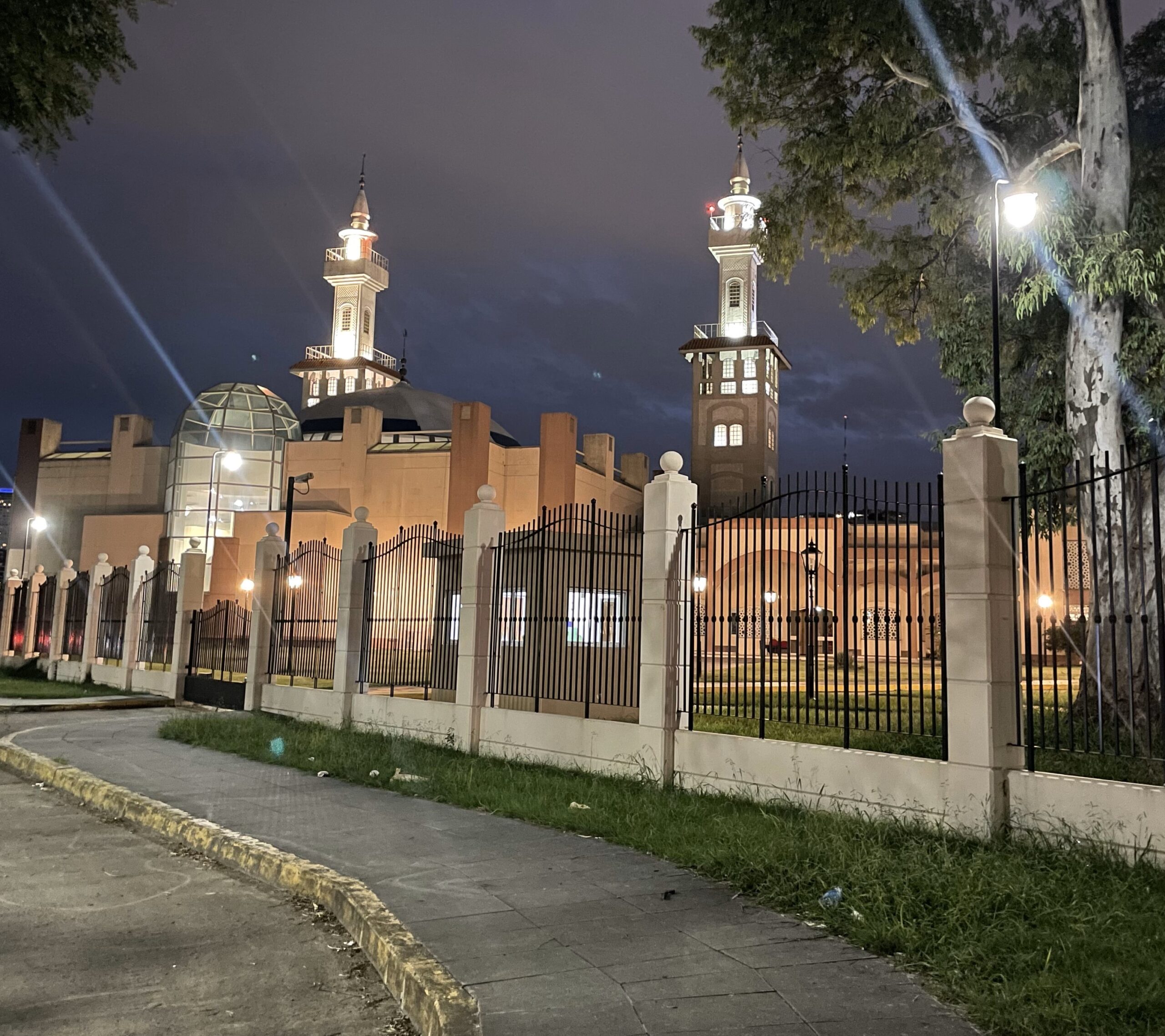Ramadan in Buenos Aires
By: Zoya Ahmer, CAS ’25

King Fahd Mosque and Islamic Cultural Centre or “Centro Cultural Islámico Rey Fahd”, the largest mosque in Latin America.
Zoya, one of the Semester Abroad Global Correspondents, shares her experience abroad during the Spring 2024 semester. Follow along with the group of correspondents on our blog and look out for their images on the @pennabroad Instagram feed.
Before studying abroad, all students were advised that it would at times feel lonely and to make sure to try to stay connected with those at home. Though, I did not fully grasp how being abroad during Ramadan, a month of fasting observed by Muslims worldwide, could evoke a mix of emotions. Traditionally during this month, I wake up before dawn to begin my fast, breaking it at sunset with the comforting presence of family or friends. The transition was initially difficult to adjust to (as many things are living in another country), but while the familiar routines of family gatherings and community prayers are thousands of miles away, I have found spending Ramadan abroad to be a profoundly enriching experience, giving me an unique opportunity for spiritual reflection and growth and learn more about my religion and Argentina through the lens of a different language and lifestyle.
 One of the most remarkable things about studying abroad is the exposure to diverse cultures and traditions. I have used this past month to learn about the customs and practices of the local Muslim community. On the 27th day of Ramadan, a special night called Layat al-Qadr, also known as the “Night of Power”, I attended a suhoor, the meal consumed early in the morning by Muslims before fasting before dawn, at a local mosque. There, I began my fast with other Muslims, participated in communal prayers, and engaged in conversations with fellow Muslims from different backgrounds! Many people asked me how long I had been Muslim, a question I had never been asked before. Most of the Muslims close to me have had generations of Muslim families, and this question was testament to the diverse narratives within the Argentinean Muslim community. I had conversations with them about their faith and the community in the city of Buenos Aires. We also talked about the somber tone in Ramadan this year and how many celebrations for Muslims around the world are different. For example, in Bethlehem, there are few Ramadan decorations or lights with Palestinians instead having a bitter coffee and a date, usually consumed to mark mourning, on Tuesdays and Wednesdays, when celebratory feasts are normally held. Getting to have discussions, meet this new community, and see how they interact and practice in Argentina was incredible. Embracing cultural diversity also helped deepen my understanding of Islam and foster a sense of unity within the global Muslim community, which I have not gotten the chance to do before.
One of the most remarkable things about studying abroad is the exposure to diverse cultures and traditions. I have used this past month to learn about the customs and practices of the local Muslim community. On the 27th day of Ramadan, a special night called Layat al-Qadr, also known as the “Night of Power”, I attended a suhoor, the meal consumed early in the morning by Muslims before fasting before dawn, at a local mosque. There, I began my fast with other Muslims, participated in communal prayers, and engaged in conversations with fellow Muslims from different backgrounds! Many people asked me how long I had been Muslim, a question I had never been asked before. Most of the Muslims close to me have had generations of Muslim families, and this question was testament to the diverse narratives within the Argentinean Muslim community. I had conversations with them about their faith and the community in the city of Buenos Aires. We also talked about the somber tone in Ramadan this year and how many celebrations for Muslims around the world are different. For example, in Bethlehem, there are few Ramadan decorations or lights with Palestinians instead having a bitter coffee and a date, usually consumed to mark mourning, on Tuesdays and Wednesdays, when celebratory feasts are normally held. Getting to have discussions, meet this new community, and see how they interact and practice in Argentina was incredible. Embracing cultural diversity also helped deepen my understanding of Islam and foster a sense of unity within the global Muslim community, which I have not gotten the chance to do before.
While I expected and hoped to learn more about the culture and practices in Buenos Aires, I was not expecting to also share facets about my culture. As Islam remains a minority religion in Argentina, I’ve had the privilege of introducing elements of my culture and religion to my host family, starting with a gift of custom embroidered pillowcases that my family brought from Pakistan. I have told her about my family and my parents’ childhood there and my experience growing up in the U.S. and I have also gotten to hear about her experiences in Argentina, around the world, and raising her daughters here. Experiencing Ramadan in Buenos Aires and engaging in conversations have not only deepened my appreciation for Argentinean culture but have also fostered a profound sense of belonging, even through the thousands of miles that separates me from home.
The Semester Abroad (SA) program offers undergraduate students the opportunity to study in a new global community through extended study for a semester or year. Penn Abroad partners with top institutions around the globe and collaborates with Penn’s undergraduate schools to offer programs for students across academic disciplines.